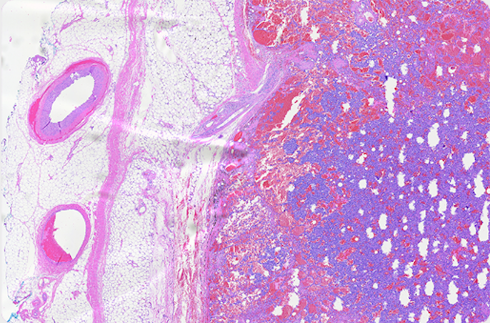Knowing a tumor’s genetic fingerprint can aid in the diagnosis and prognosis of cancer and inform treatment decisions. SearchLight DNA is an extensively validated, next-generation diagnostic test that identifies important mutations in 120 relevant cancer genes. The most informative canine cancer genomic diagnostic test available, it incorporates all high-quality diagnostic, prognostic, and predictive biomarkers known from canine and human cancer studies to provide greater clarity about the behavior of your patient’s tumor.
Based upon the DNA mutations present in a tumor, SearchLight DNA identifies drug therapies that target those specific mutations as well as therapies that are unlikely to be effective or may even result in accelerated tumor growth. The test is appropriate for fine-needle aspirates (FNA), formalin-fixed, paraffin-embedded (FFPE) tissue, or fresh frozen tumor samples. Knowing you are targeting the specific mutations in your patient’s tumor enables you to treat with greater confidence.
To learn more about how SearchLight DNA was validated view the poster from the Veterinary Cancer Society Conference


By finding mutations in the DNA of your patient’s cancer cells, Vidium’s SearchLight DNA can help guide your veterinary team in understanding a cancer’s origin, its behavior, and the optimal approach to its treatment.
Many cancers are recognizable to the trained pathologists and oncologists who diagnose and treat them.
But not all cancers. Sometimes the mutations in a cancer can guide diagnosis, which is a key part of understanding what that tumor will do in the body. Some mutations only occur in specific cancer types or sub-types and so they can aid the veterinary team in identifying the cancer types.

Many mutations have been associated with a better or worse prognosis.
Thinking about the future and what comes next may be the scariest aspect of cancer. Knowing as much as we can about a cancer’s potential behavior is critically important for guiding pet families and veterinarians as they work together to generate the very best plan for that particular cancer in that particular patient and that specific family.

The whole point of understanding cancer is understanding how to stop it.
In human oncology, hundreds of safe and effective “precision therapies” exist that are directed against a cancer’s specific mutations. Fewer precision therapies exist in veterinary medicine, but as we better understand therapeutic targets in pet cancers, we believe that these therapies will become increasingly available. In some cases, we can use human drugs that are available today.

At Vidium, we partner with your pathologists to gain as much information about your patient’s tumor as possible.
A tumor that you aspirate or biopsy can be sent directly to our laboratory for genomic analysis with SearchLight DNA. If the sample has already been submitted to another lab, Vidium will coordinate the transfer of it to our laboratory at no additional cost.
Our scientists extract and sequence the DNA to identify the unique mutations in your patient’s tumor. We then use our proprietary database, Vidium Insight™, which curates the latest scientific information to provide diagnostic, prognostic, and treatment guidance for the mutations that were identified. With these results, you may be able to prescribe oral therapies that target the specific mutations in your patient’s tumor.
Cancer Patient
Pet with suspected cancer visits the veterinarian.
Veterinary Team
The veterinary team performs a biopsy to collect a sample of the tumor. The sample is sent to Vidium or is sent to a pathologist and then sent to Vidium.
Vidium Animal Health
Vidium performs tumor DNA sequencing and analysis with SearchLight DNA, annotating the tumor mutations with biomarker data from its knowledge database.
Reports
Vidium provides a detailed report to the veterinary team with information about the tumor’s mutations and their associations with diagnosis, prognosis, and treatment.
Time is a critical factor in cancer care and SearchLight DNA provides veterinarians a deeper understanding of cancer pathogenesis and behavior to help make informed decisions as quickly as possible.
When primary care veterinarians order a SearchLight DNA test, they can share the results with the referral oncologist prior to the first referral appointment. Working together, members of the cancer care team may be able to initiate treatment sooner. Where therapeutic options exist for a patient, primary care veterinarians can initiate:
Short-term treatment until the patient can meet with an oncologist
Long-term treatment if there is no referral to specialty care